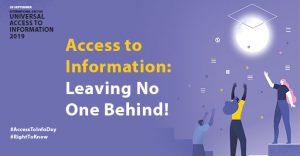Help us protect the commons. Make a tax deductible gift to fund our work. Donate today!
Today is the International Day for Universal Access to Information (IDUAI).

Image credit: UNESCO, CC BY-SA 3.0 IGO
You may be wondering why this day is necessary—particularly in 2019, when the average person is inundated with an estimated 34 gigabytes of information every day, from emails and text messages to Youtube videos and news programs. In fact, it’s easy to take information for granted. However, access to public information, in particular, is not universal.
“Although technology has increased the amount of information and systematized the collection of data, people and communities across the world still lack access to critical, public information,” explains Bushra Ebadi. As a researcher and Executive Committee Member of the Canadian Commission for UNESCO, Bushra relies on public information to study and develop solutions for issues such as insecurity, corruption, inequality, and climate change.
Access to information “is an integral part of the right to freedom of expression” and “a key enabler towards inclusive knowledge societies.”
According to Moez Chakchouk, UNESCO’s Assistant Director-General for Communication and Information, access to information “is an integral part of the right to freedom of expression” and “a key enabler towards inclusive knowledge societies.” Despite this, UNESCO says that many governments “do not have national legislation on access to information as a specific expression of the law,” otherwise known as freedom of information legislation. This means that millions of people do not have the right or the ability to access public information. Further, “Even when these laws exist they are not necessarily abided by,” adds Bushra, “there can be a lot of red tape to access information in a timely manner.”
This lack of access is particularly worrying for researchers and activists, like Bushra. Without universal, open access to data from governments or research institutions, for example, developing effective solutions to global problems is difficult.
A Closer Look At Government Data
Increasingly, governments are using tools like Creative Commons’ CC0 Public Domain Dedication (CC Zero) to maximize the “re-use of data and databases” by clarifying that these resources are in the public domain and not restricted by copyright. However, there are many instances when data collected by governments are not made easily accessible (e.g., through an online data portal or open source data set).
In 2017, the World Wide Web Foundation found that almost every country included in its Open Data Barometer report failed to adequately share important data with the public. For example, only 71% of the observed government data sets were published online, only 25% were available via an open license, and only 7% of government data sets were truly open—meaning they “can be freely used, modified, and shared by anyone for any purpose.” The Foundation also reported that many of the available data sets were “incomplete, out of date, of low quality, and fragmented.”
In her work, Bushra often relies on government data to conduct policy research, but has routinely experienced problems. “The relevance of the data is largely dependent on how and what information was collected, as well as the format it is available in,” she explains. While studying issues related to forced migration and gender discrimination in the Global South, for example, she found it difficult to access reliable data.
“By restricting access to those who can afford it or have power and privilege, we support a system and culture of elitism…”
To compensate for this lack of data, researchers must often rely on data collected by non-government entities—which are typically kept behind expensive paywalls. According to Bushra, this is particularly detrimental. “By restricting access to those who can afford it or have power and privilege, we support a system and culture of elitism in which a select group of people with access are able to dictate what is done with information and how it is used.”

Image credit: Rights Con 2019, CC BY-NC 2.0
The Power of Information
Universal, open access to public information, particularly government data, not only facilitates scientific collaboration and innovation, it also empowers communities that have been historically marginalized and silenced.
“Access to information is intrinsically tied to the right to know and the right to exist,” Bushra emphasizes, “and without access to information, citizens lack the tools they need to hold their governments and people in power accountable.”
Information is powerful—that’s why, even in 2019, the International Day for Universal Access to Information remains not only important, but necessary.
To learn more and get involved, visit UNESCO’s website or sign up for their newsletter.
Posted 28 September 2019